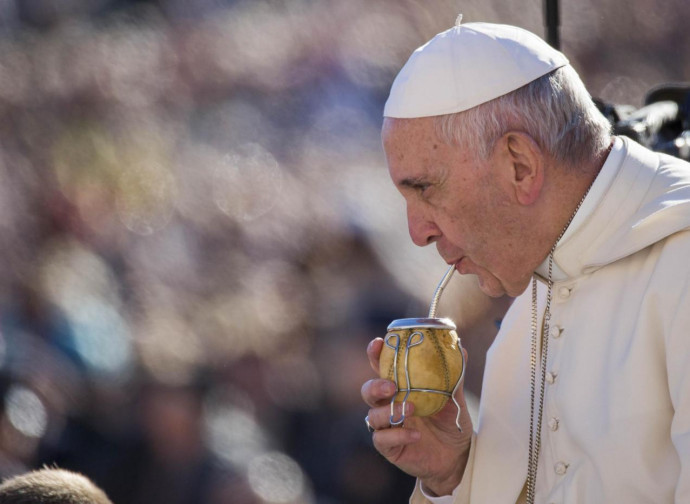Pope Francis, ten years of turmoil and dismay
Movementist tactics, the primacy of praxis, pastoralism, moral relativism: processes that should have produced some new truths have actually scandalised, confused minds and hearts, and disarticulated ecclesial unity. And synodality, a new dogma, is the synthesis of a process in which the means count more than the end.

Today, the tenth anniversary of Francis' pontificate creates considerable dismay. It is as if someone has intervened to jumble all the cards on the table, leaving everyone speechless both for the method used and for the new content concerning very sensitive points of the Catholic faith. Method and new content have matched each other, to the point that method has become content and vice versa.
It has been ten years of movementist tactics: saying and not saying, affirming and retracting, going forward while saying that one was going backward, making others say what one would like to say oneself, opening and closing, accepting and condemning, declaring and contradicting. Just when you thought you had understood, Francis had already moved on. By the time, one of his interviews had just been read, he had already given another of a different tenor. In the interviews with Italian journalist Eugenio Scalfari it was never clear who had said what. Quotations from the Bible and the Magisterium, often partial and inaccurate; footnotes used to provoke great changes without making them apparent; phrases with a thousand nuances; love for those far away and raps on the knuckles for those nearby; endless receiverships; political interventions; protection of questionable characters; the promotion of doubts of faith made without cultivating any doubts... these are some examples of a method that has caused bewilderment.
It is unrealistic to attribute this only to Bergoglio's personal temperament or his Jesuitism. The results of changes designed to regain the ground of two hundred years behind the world certainly required official acts of content modification, such as Amoris laetitia or the Abu Dhabi declaration, but also the change in praxis and the ways of thinking they induce. The circular relationship between praxis and theory, pastoral care and doctrine, is in fact not a particular chapter of this pontificate, but its guideline. This is why the dismay has also come about through communication as well as through a change of perspective on content.
Precisely because he wants doctrine within pastoral care, Francis has been intolerant with the dogmatists, the doctrinaires, the rigid, and open with the adventurers, the innovators, the intolerant. For this very reason, his has been an anti-metaphysical pontificate. The Wojtyla-Ratzinger Fides et ratio has been effectively silenced. As soon as he was elected, Francis declared that Kasper is "a great theologian" and Kasper, on the eve of the two synods on the family, told the cardinals that there are not remarried divorcees but this or that particular couple of remarried divorcees. It was the declaration that reality and morality do not lend themselves to universal knowledge, as metaphysically based ones do, and that the norm is always within a situation, so that each individual situation had to be encountered from within and no longer judged.
It was pastoralism getting rid of doctrine, it was the assumption of nominalist philosophy: experience is made up of absolutely singular situations that therefore cannot be judged. But nominalism is the philosophy behind the Protestant Reformation. After Amoris laetitia, in fact, it is the conscience of the subject that takes centre stage in the moral life.
This also silences Veritatis splendor. In this decade substantial changes were made in Catholic moral theology, all along the lines of replacing judgement, which starts from the norm and reality, with discernment, which instead starts from the situation and conscience. Christ's commands are transformed into ideals, sin from exclusion from grace becomes an inadequate stage of life, the new law does not require compliance with natural law but reinterprets it, the Church must listen, integrate, accompany along the paths of existence, and nothing else.. Proclamation would exist in this practice without content, reference to content would instead be proselytism or ideology. This new vision of moral theology ends up neglecting Christian natural law, declaring even the Social Doctrine of the Church in its traditional version outdated.
Pastoralism induced various processes that were scarcely guided by doctrine, but often had an experimental character, thinking that since they were based on the people they could intercept and live the Spirit's suggestions in their existential journey. Even these processes, such as the German Synod to recall the most disruptive one, which began and then inevitably became complicated, have been very disconcerting. They were not governed in the light of traditional doctrine and in the name of the primacy of Peter. They were provoked and experienced as processes that from dialectical confrontation should have produced some new truths, at least of pastoral attitude. But instead they scandalised, confused minds and hearts, and disarticulated ecclesial unity. The negative repercussions on the very conception of the role of the papacy are disturbing.
All these elements have converged in the perspective of synodality, which is perhaps the most expressive feature of the decade that has now ended. On the one hand it is proposed as a new dogma and a panacea, on the other hand it is understood as a new adventure in which the fundamental thing is how one lives together rather than why and to what end. And so we return to the con-fusion of theory and praxis, the immanence of doctrine in pastoral care and the coincidence of method and content.
There is no doubt that the Church will recover. But the upheaval has been there, and it has left behind considerable bewilderment.
